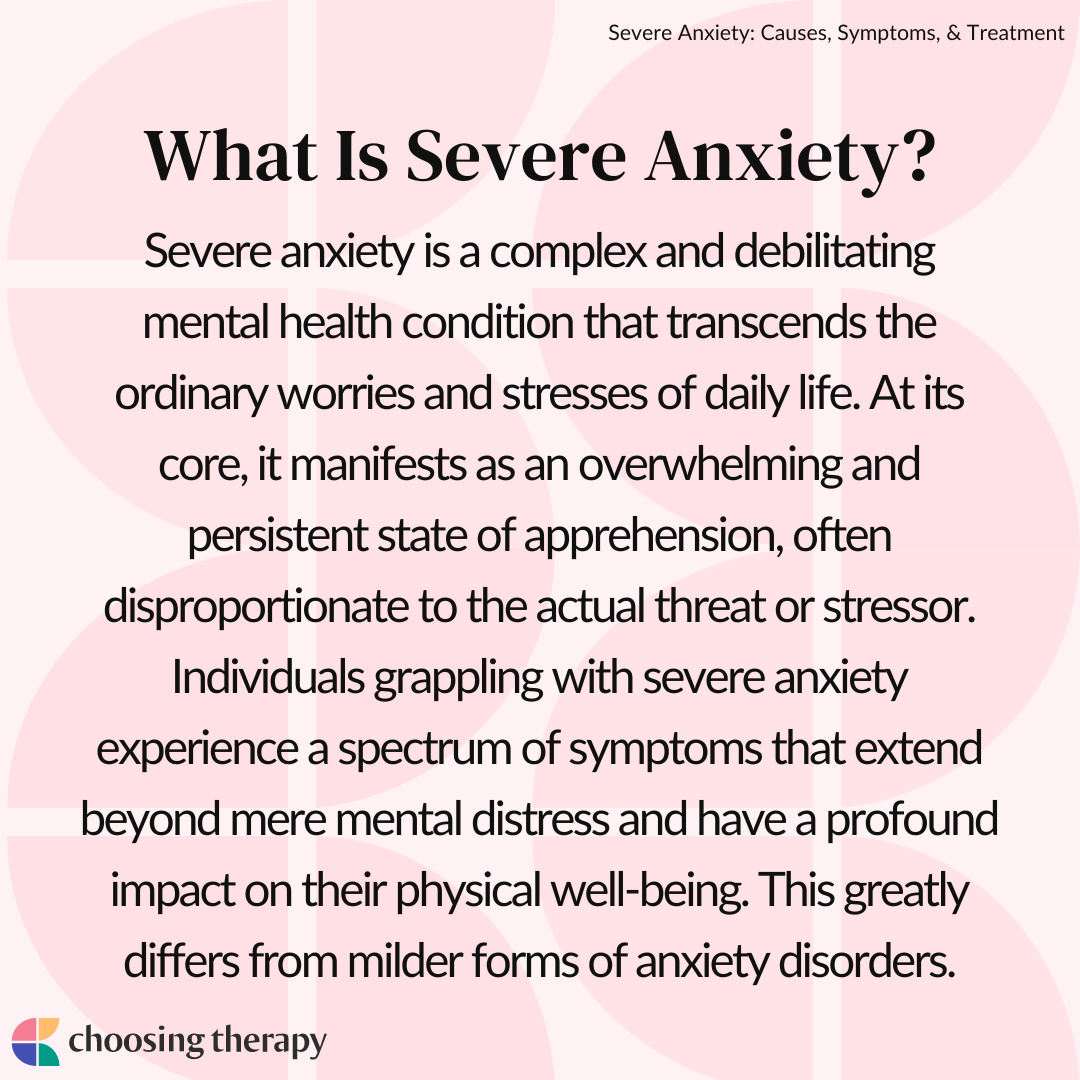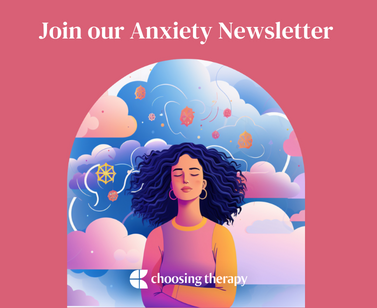Severe anxiety refers to an intense and persistent state of excessive worry, fear, or apprehension that significantly interferes with daily functioning. It is a mental health condition characterized by heightened emotional and physical responses to perceived threats or stressors.
Find a supportive therapist who can help with anxiety. BetterHelp has over 20,000 licensed therapists who provide convenient and affordable online therapy. BetterHelp starts at $65 per week. Take a Free Online Assessment and get matched with the right therapist for you.
What Is Severe Anxiety?
Severe anxiety is a complex and debilitating mental health condition that transcends the ordinary worries and stresses of daily life. At its core, it manifests as an overwhelming and persistent state of apprehension, often disproportionate to the actual threat or stressor. Individuals grappling with severe anxiety experience a spectrum of symptoms that extend beyond mere mental distress and have a profound impact on their physical well-being. This greatly differs from milder forms of anxiety disorders.
The cognitive aspects involve incessant, intrusive thoughts, an inability to shake off irrational fears, and a heightened sensitivity to potential dangers. Emotionally, those with severe anxiety find themselves ensnared in a web of intense fear, restlessness, and an omnipresent sense of dread, exacerbating their psychological distress.1
Types of Severe Anxiety
Severe anxiety often materializes into specific anxiety disorders, such as Generalized Anxiety Disorder (GAD), Panic Disorder, Social Anxiety Disorder, or various phobias, each with its unique set of challenges. Severe anxiety itself is not a formal diagnosis. The causes of severe anxiety are multifaceted, intertwining biological factors like genetic predisposition and neurochemical imbalances with environmental influences such as traumatic experiences and chronic stress. Additionally, an individual’s psychological makeup, including personality traits and coping mechanisms, can contribute to the development and perpetuation of severe anxiety.
Categories of anxiety include:
- Panic disorder
- Specific phobias
- Generalized anxiety disorder
- Social anxiety disorder
- Obsessive-compulsive disorder
- Separation Anxiety
- PTSD
- Agoraphobia2
Causes & Risk Factors for Severe Anxiety
The causes of severe anxiety are complex and multifaceted, often involving a combination of genetic, biological, and environmental anxiety triggers and psychological factors. Additionally, specific risk factors may contribute to the development or exacerbation of severe anxiety disorders.
Risk factors of severe anxiety include:
- Genetic factors
- Chemical imbalances
- Differences in brain structure
- Environment and exposure to harmful stimuli
- Chronic stress
- Personality
- Family dynamics
- Substance use and prescription medications
- Biological factors
- Gender and cultural factors
Situations and events that may trigger severe anxiety include:
- Having financial insecurity
- Experiencing a miscarriage
- Worrying about global issues
- Death of a loved one
- Surviving a traumatic experience
- Living through natural disasters
- Uncertainty such as during the pandemic
- Chronic health issues
- A pattern of unstable relationships
- Going through a painful divorce1
Symptoms of Severe Anxiety
Severe anxiety is associated with a range of symptoms that encompass cognitive, emotional, and physical aspects. They can be different from symptoms of mild or moderate anxiety in that they are a lot more severe and less likely to be self-treatable.
Options For Anxiety Treatment Talk Therapy – Get help from a licensed therapist. Betterhelp offers online therapy starting at $65 per week. Free Assessment Psychiatry for Anxiety – Looking for anxiety treatment that prioritizes you? Talkiatry can help. Find an in-network psychiatrist you can see online. Get started with our short assessment. Visit Talkiatry
Some symptoms of severe anxiety include:
Avoidance
Actively avoiding situations, places, or activities that are perceived as potential triggers for anxiety. Changes in routine or behavior to minimize exposure to anxiety-provoking stimuli.
Excessive Worrying
Intense fear, restlessness, irritability, and a pervasive sense of dread. Persistent and intrusive thoughts about a wide range of concerns, often involving catastrophic or negative outcomes. Difficulty controlling or stopping the worrying, even when there is no apparent cause for concern.
Physical Symptoms
Increased heart rate, muscle tension, sweating, trembling, dizziness, shortness of breath, and gastrointestinal discomfort are all symptoms of severe anxiety.
Some common ways anxiety is experienced physically include:
- Muscle Tension: Chronic muscle tension leading to stiffness, aches, or headaches.
- Increased Heart Rate/Racing Heartbeat: Elevated heart rate, palpitations, or a feeling of a racing heart.
- Shortness of Breath: Difficulty breathing, rapid or shallow breathing.
- Gastrointestinal Distress: Nausea, stomachaches, diarrhea, or other digestive issues.
- Sweating: Profuse sweating, even in non-strenuous or cool conditions.
- Trembling or Shaking: Involuntary shaking or trembling, often noticeable in the hands or limbs.
- Dizziness or Lightheadedness: Feeling unsteady or dizzy, sometimes accompanied by a sensation of faintness.
- Fatigue: Persistent feelings of exhaustion or weariness, even without physical activity
- Headache
Cognitive Symptoms
Racing thoughts or a mind that feels constantly busy. It can be difficult to concentrate or focus on a task. Memory is also impaired and recalling recent events is very difficult to do.
Emotional Symptoms
One may feel intense feelings of despair and agony, like they are expecting something terrible to happen. Their expression of these feelings may appear to be irrational and without cause and this may make it difficult to manage. Experiencing positive emotions can be a huge challenge.
Sleep Disturbances
One may have a hard time falling and staying asleep. They may wake up frequently, feel restless, experience insomnia and wake up feeling tired.
Panic Attacks
One may have a sudden onset of fear that is seemingly unprovoked. They may have chest pain, sweating, and dizziness accompanied by this feeling of fear. They may be afraid they are dying.3
Diagnosing Severe Anxiety
Diagnosing severe anxiety typically involves a comprehensive process that includes a thorough assessment of a person’s symptoms, medical history, and other relevant factors. Mental health professionals, such as psychiatrists, psychologists, or licensed therapists, are usually involved in the diagnosis.
One must undergo clinical interviews where the therapist gathers information about the patient’s symptoms, history, and stressors. They also have to meet diagnostic criteria. Mental health professionals will also take into account medical and physical histories and evaluations, including family history, to determine any genetic factors. They may also consider using a differential diagnosis to help explain symptoms to rule out any other variables. Patients will be asked to take many self-reported assessments and questionnaires to help come up with conclusions. All of this, combined with understanding the duration of how long these feelings have been going on, will lead to a discussion with the patient and the mental health team to come up with a diagnosis.4
How to Cope With Severe Anxiety
Coping with severe anxiety is different from GAD. Severe anxiety typically requires professional treatment, but there are anxiety coping skills that people can learn to help reduce symptoms.
Would you like to have less anxiety? Anxiety is treatable with therapy. BetterHelp has over 20,000 licensed therapists who provide convenient and affordable online therapy. BetterHelp starts at $65 per week. Take a Free Online Assessment and get matched with the right therapist for you.
Some ways to cope with chronic anxiety include:
- Stress management techniques: Stress management techniques are great tools to use when you are feeling on edge and they can help bring down heart rate and ground us in the here-and-now.
- Exercise: Exercise helps anxiety as it helps to reduce the amount of cortisol and releases endorphins that help us feel satisfied and balanced.
- Mindfulness: Practice mindfulness techniques, such as mindfulness meditation or yoga, to cultivate awareness and promote a sense of calm.
- Relaxation techniques: Practice deep breathing exercises, progressive muscle relaxation, or meditation to help calm your mind and body during anxious moments.
- Sleep: Prioritize good sleep hygiene. Establish a regular sleep schedule, create a comfortable sleep environment, and avoid stimulants before bedtime.
- Healthy lifestyle choices: Maintain a balanced diet, limit caffeine and sugar intake, and avoid excessive alcohol or substance use, as these can exacerbate anxiety.
- Goal setting: Break down tasks into smaller, manageable goals. Celebrate achievements, no matter how small, to build a sense of accomplishment.
- Journaling: Keep a journal to track your thoughts, feelings, and triggers. This can help you identify patterns and work through challenging situations.
- Self-compassion: Be kind to yourself. Accept that anxiety is a challenging condition, and recognize your efforts in managing it. Practice self-compassion and self-care.
Treatment Options for Severe Anxiety
Treatment for severe anxiety typically involves a multifaceted approach, combining psychotherapy, medication, and lifestyle changes. Healthcare professionals may prescribe medications such as anti-anxiety medications or antidepressants to alleviate symptoms. Lifestyle changes, including regular exercise, adequate sleep, and stress management techniques, play a crucial role in supporting overall mental well-being. A collaborative effort between the individual and mental health professionals is essential to tailor a treatment plan that addresses specific needs and fosters sustainable coping strategies for managing and overcoming severe anxiety.
Therapy
There are multiple therapy options for anxiety. One may use a single type of therapeutic approach or a combination. The right kind of therapy depends on your goals and your history. A therapist who has a working understanding of severe anxiety can help you make that determination. Some common types of therapy for severe anxiety include:
- Cognitive behavioral therapy (CBT): Cognitive-behavioral therapy (CBT) is a commonly employed therapeutic modality, focusing on identifying and modifying negative thought patterns and behaviors associated with anxiety.
- Exposure therapy: Exposure therapy for anxiety involves systematically and gradually confronting feared situations or stimuli in a controlled and supportive environment. By exposing individuals to anxiety triggers in a systematic way, this therapeutic approach aims to desensitize and retrain the mind’s response, helping individuals build resilience and reduce the intensity of anxiety associated with specific fears or phobias.
- Dialectical Behavioral Therapy (DBT): Dialectical Behavior Therapy (DBT) teaches skills for emotional regulation, mindfulness, and interpersonal effectiveness.
- Acceptance and Commitment Therapy (ACT): Acceptance and Commitment Therapy (ACT) encourages acceptance of anxious thoughts and feelings while promoting actions aligned with personal values.
- Psychodynamic Therapy: This approach explores the unconscious processes contributing to anxiety, often focusing on unresolved conflicts, early life experiences, and the impact of past relationships.
- Interpersonal Therapy (IPT): IPT focuses on improving interpersonal relationships and communication skills, addressing how these factors contribute to and are affected by anxiety.
- Schema Therapy: This integrative approach combines cognitive, behavioral, and experiential techniques to identify and change maladaptive patterns or schemas contributing to anxiety.5
Betterhelp – Affordable, convenient, online therapy – Get 20% Off Your First Month
Medication
Medication management is often considered as part of the treatment plan for severe anxiety, particularly when symptoms are significantly impacting an individual’s daily functioning.
There are options such as antidepressants and anti-anxiety medication. The choice of medication depends on factors such as the specific anxiety disorder, the individual’s medical history, and the presence of any co-occurring conditions.
Medication management is often most effective when combined with psychotherapy, lifestyle modifications, and ongoing monitoring to ensure the best outcomes for individuals experiencing severe anxiety. Regular communication with healthcare providers helps adjust the treatment plan based on the individual’s progress and any potential side effects.
Psychiatry For Anxiety Looking for anxiety treatment that prioritizes you? Talkiatry can help. Find an in-network psychiatrist you can see online. Get started with our short assessment.
Where to Find Professional Help for Chronic Anxiety
Dealing with severe anxiety doesn’t have to be something you do on your own. You can find a therapist or a psychiatrist that can help you. If you are wondering how to find a therapist, there are many places you can begin. You can start by looking up your insurance benefits and searching for anxiety specialists. You can also search an online therapist directory to view potential options for providers. Friends or family may be able to refer you. Many primary care practices may be able to give you referrals for psychiatrists as well. Take it one step at a time and know that there are many resources out there for you that will help you. If you find one and decide you try them out but are not happy, don’t hesitate to try another therapist. IT is perfectly normal to see one or two before finding a therapist who is a good fit for you.
In My Experience
To help our readers take the next step in their mental health journey, Choosing Therapy has partnered with leaders in mental health and wellness. Choosing Therapy is compensated for marketing by the companies included below. Talk Therapy Online-Therapy.com – Get support and guidance from a licensed therapist. Online-Therapy.com provides 45 minutes weekly video sessions and unlimited text messaging with your therapist for only $64/week. Get Started Virtual Psychiatry Hims / Hers If you’re living with anxiety or depression, finding the right medication match may make all the difference. Connect with a licensed healthcare provider in just 12 – 48 hours. Explore FDA-approved treatment options and get free shipping, if prescribed. No insurance required. Get Started Anxiety Newsletter A free newsletter from Choosing Therapy for those impacted by anxiety. Get helpful tips and the latest information. Sign Up Learn Mindfulness, Meditation, & Relaxation Techniques Mindfulness.com – Change your life by practicing mindfulness. In a few minutes a day, you can start developing mindfulness and meditation skills. Free Trial Choosing Therapy Directory You can search for therapists by specialty, experience, insurance, or price, and location. Find a therapist today.Additional Resources
Online Anxiety Test A few questions from Talkiatry can help you understand your symptoms and give you a recommendation for what to do next. How Does ERP Help With Intrusive Thoughts? Obsessive compulsive disorder (OCD) is a psychiatric condition marked by the presence of obsessive thoughts, images, doubts, or urges, followed by compulsive behaviors or acts aimed at easing the distress caused by the obsession. While the content of the obsessions can take many forms, they are always repetitive, persistent, involuntary, and intrusive, and they often result in a great deal of anxiety for the person experiencing them.








